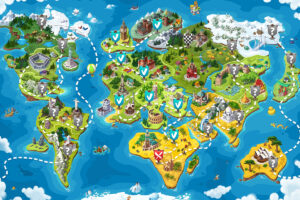Narrative-driven games like Detroit: Become Human, Life Is Strange, and The Walking Dead resonate deeply with players thanks to their compelling storylines, well-developed characters, and the emotional choices they present. Localization for these games, therefore, requires more than straight translation. The adaptation of dialogue, cultural nuances, and how the game presents choices to players are also necessary considerations for conveying the same sentimental impact in every version, no matter the language. This article explores the unique localization challenges of narrative-driven games and the role of cultural sensitivity and storytelling in delivering immersive experiences to players worldwide.
Emotional Dialogue: Translating Tone & Nuance
Narrative games rely on dialogue to drive the story and emotionally connect players with characters. Translating this dialogue, then, means capturing not only the words, but also the tone and subtle nuances of the source language to make these interactions feel just as real and impactful in subsequent versions for different audiences.
In Life Is Strange, for instance, the relationship between characters like Max and Chloe is central to the game. Translators must consider each character’s personality and the emotional weight of their conversations to preserve the same sense of vulnerability, friendship, and tension when communicating them across languages. Every word choice matters, as even a small misstep can alter the perceived relationships and emotional depth of the original story.
Similarly, Detroit: Become Human presents complex themes surrounding humanity, morality, and artificial intelligence. Localizers must therefore work carefully to adapt Connor, Markus, and Kara’s storylines in a way that maintains each character’s emotional journey through these elements. The process involves collaborating with the game’s original developers to fully understand the intent behind each line of dialogue, so that players around the world experience the characters’ same moral dilemmas and emotional impact.
Player Choices & Consequences: Adapting for Cultural Sensitivity
Narrative-driven games often allow players to make choices that influence the storyline. These choices need a careful adaptation to resonate with players from different cultures, because decisions may have varying cultural implications or moral weight from one region to another.
In Detroit: Become Human, players face life-altering decisions for characters, often within intense social and ethical contexts. Translators must ensure that each of these choices (and its consequences) makes sense for players in different areas of the world, which requires carefully navigating cultural sensitivities to avoid unintended interpretations. This may mean a translator will adjust the wording of a choice, or subtly adapt an outcome to reflect the cultural context of the audience, without altering the core narrative.
In Life Is Strange 2, similarly important choices present themselves that involve family relationships, identity, and personal growth—and in this game, American culture heavily influences these choices. When localizing them, therefore, teams take into account cultural views on family dynamics, friendships, and social norms of non-American audiences to make sure that players across the globe feel a connection to the storyline and understand the stakes at play in their decisions.
Handling Culturally Specific References: Making the Game Relatable
Localization teams must be hyper-vigilant for the cultural references, slang, or idioms that so often reflect a narrative game’s setting. These referential elements must be adapted or replaced in order to make the game relatable to players in other regions, while preserving the authenticity of the setting.

Life Is Strange is rich with American cultural influence, from its many music references to the frequent slang used by characters. Translators adapt these details thoughtfully, sometimes opting for regional equivalents that maintain the same impact. This approach allows the game to feel both familiar and immersive for international players without sacrificing its original atmosphere.
The post-apocalyptic world of The Walking Dead, too, often taps into American cultural sentiments; in this case to their survival tropes and societal norms. Localizers work to translate these references in a way that international players can grasp, without detracting from the game’s gritty, immersive setting. By doing so, linguists allow players from diverse backgrounds to fully experience the tension that accompanies the fight for survival in such a world.
Character Development & Personality Consistency
Character development is central to narrative-driven games, and maintaining personality consistency across multi-language versions is crucial. Each character’s voice, tone, and identity must remain intact to ensure that players around the globe can connect with them as the story unfolds.
Detroit: Become Human brims with characters whose personalities vary depending on their backstories and unique roles in the game. Dialogue adaptation again is key here, as translators must work carefully to keep character motivations and personalities consistent. Connor’s analytical tone, Markus’s revolutionary passion, and Kara’s maternal instinct, for instance, are core to their characters, and any shift in tone could disconnect players from their journeys.
In Life Is Strange, characters like Chloe and Rachel are defined by their rebellious, expressive personalities. Localization teams work to keep this energy alive across languages, so that the same spirit that makes these characters relatable and impactful resonates with audiences, regardless of cultural context.
Balancing Player Immersion with Accessibility
Narrative-driven games require players to stay fully immersed in the story in order to make progress, and that level of immersion requires localization teams to also consider different elements of accessibility in their translation. What will feel natural and approachable to a particular audience? Will the visual and auditory cues of the original game make the same amount of sense to the target audience, or will complementary adjustments be necessary?

One example of these considerations at work is present in Detroit: Become Human. In this game, player decision-making can alter entire story arcs, so clarity in choice-based text is critical. Translators must ensure that diverse audiences can understand each choice and its potential consequences, without simplifying the narrative’s complexity. Therefore, clear, accessible language, both written and verbalized, and the careful localization of other visual and auditory cues, can help players remain immersed in the story, even as they navigate complicated decisions that affect the game’s outcome.
The Takeaway
The localization of narrative-driven games goes beyond translating text. Put more accurately, localization is about re-creating the emotional depth, character dynamics, and cultural elements that make these stories impactful. By adapting dialogue, regional nuances, and the presentation of player choices, localization teams bring powerful stories to players worldwide. Thanks to their meticulous attention to detail and deep cultural sensitivity, these teams ensure that players from all backgrounds can fully experience and connect with the rich, immersive worlds of narrative-driven games.



